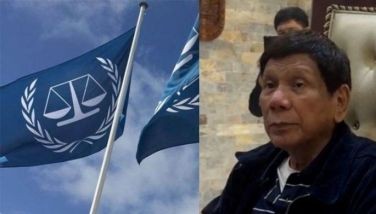Count on no reciprocity
April 20, 2007 | 12:00am
Believe it or not, but in a poll of 18 countries conducted by the Chicago Council on Global Affairs, the Philippines has emerged as the staunchest believer in the United States and its foreign policy.
The Philippines emerged as even more trusting of America than Israel, whose precarious but continued existence in the Middle East, a land full of its enemies, is made possible to a large extent only because of the solid backing of the United States.
The poll conducted by the Chicago Council on Global Affairs showed that there is now a widespread concern among many countries that the United States cannot be trusted to act responsibly.
The poll, however, also shows that while there is now so much negative feelings about the US interventionist foreign policy, the same countries exhibiting such negative feelings also do not want the US to completely back off from its role as policeman of the world.
" There''s clearly a trend in terms of deepening negative attitudes to the US in how it executes foreign policy, " said Christopher Whitney, executive director for studies at the Chicago Council on Global Affairs.
" The US has long faced criticism internationally for its interventionist foreign policy, " he said. " This survey found that the frustration is broader in scope than previously thought and has deepened in the wake of the war in Iraq. "
The Philippines and Israel proved to be the staunchest supporters of America, with 85 percent and 81 percent of respondents, respectively, saying they trusted the US " a great deal. "
By contrast, three out of four Americans think their country tends to take on the role of international enforcer more than it should, that the United States has overreached itself on the global stage.
Large majorities in such countries as France ( 89 percent ), Australia ( 80 percent ), China ( 77 percent ), Russia ( 76 percent ) and Argentina ( 62 percent ), among others, showed agreement with this view by Americans themselves.
Yet the Philippines, despite what the Americans themselves overwhelmingly think, disagreed. Fifty-seven percent of Filipinos who responded to the survey do not think the US tends to take the role of international enforcer more than it should.
In fact, the Philippines is the only country surveyed that thinks so. Even the Israelis are split at an even 48 percent to 48 percent on the issue of whether the US is overreaching itself in the global policeman role.
It is not clear, however, if this staunch support of US foreign policy by Filipinos would translate into something that is beneficial to the Philippines. Indeed, judging by developments over the past decade or so, reciprocity is almost non-existent in RP-US ties.
Not that the United States is to blame for this lack of mutuality in respect and cooperation. For while the Philippines may prove to be the staunchest supporter of the US among all countries in the world, its support is largely token amid hardball global realities.
In other words, Philippine support is nothing more than a morale booster, nice to know in gloomy days but of no practical use in real politics. Counting on reciprocity is thus a pipe dream. Strong rivals China and Russia will get more respect than its weakling friends.
The Philippines emerged as even more trusting of America than Israel, whose precarious but continued existence in the Middle East, a land full of its enemies, is made possible to a large extent only because of the solid backing of the United States.
The poll conducted by the Chicago Council on Global Affairs showed that there is now a widespread concern among many countries that the United States cannot be trusted to act responsibly.
The poll, however, also shows that while there is now so much negative feelings about the US interventionist foreign policy, the same countries exhibiting such negative feelings also do not want the US to completely back off from its role as policeman of the world.
" There''s clearly a trend in terms of deepening negative attitudes to the US in how it executes foreign policy, " said Christopher Whitney, executive director for studies at the Chicago Council on Global Affairs.
" The US has long faced criticism internationally for its interventionist foreign policy, " he said. " This survey found that the frustration is broader in scope than previously thought and has deepened in the wake of the war in Iraq. "
The Philippines and Israel proved to be the staunchest supporters of America, with 85 percent and 81 percent of respondents, respectively, saying they trusted the US " a great deal. "
By contrast, three out of four Americans think their country tends to take on the role of international enforcer more than it should, that the United States has overreached itself on the global stage.
Large majorities in such countries as France ( 89 percent ), Australia ( 80 percent ), China ( 77 percent ), Russia ( 76 percent ) and Argentina ( 62 percent ), among others, showed agreement with this view by Americans themselves.
Yet the Philippines, despite what the Americans themselves overwhelmingly think, disagreed. Fifty-seven percent of Filipinos who responded to the survey do not think the US tends to take the role of international enforcer more than it should.
In fact, the Philippines is the only country surveyed that thinks so. Even the Israelis are split at an even 48 percent to 48 percent on the issue of whether the US is overreaching itself in the global policeman role.
It is not clear, however, if this staunch support of US foreign policy by Filipinos would translate into something that is beneficial to the Philippines. Indeed, judging by developments over the past decade or so, reciprocity is almost non-existent in RP-US ties.
Not that the United States is to blame for this lack of mutuality in respect and cooperation. For while the Philippines may prove to be the staunchest supporter of the US among all countries in the world, its support is largely token amid hardball global realities.
In other words, Philippine support is nothing more than a morale booster, nice to know in gloomy days but of no practical use in real politics. Counting on reciprocity is thus a pipe dream. Strong rivals China and Russia will get more respect than its weakling friends.
BrandSpace Articles
<
>
- Latest
- Trending
Trending
Latest
Recommended

April 3, 2025 - 12:00am



























